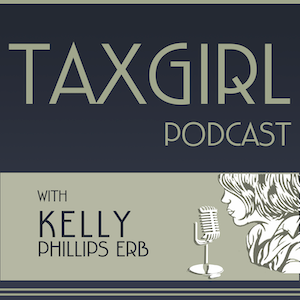76: Busting Financial Crime via Increased Transparency after Panama Papers
In response to the Panama Papers scandal, the EU agreed to regulations mandating the publication of beneficial ownership registries. It should follow, then, that the more information is accessed about individuals and corporate identities, the easier it is for financial and related entities to assist with legitimate businesses.
Daniel Wager argues that increased transparency would help improve trust in financial services; something that is critical to an industry which relies on public confidence to operate.
On today’s episode of the Taxgirl podcast, Kelly is joined by Daniel Wager to chat about fighting financial crime, increasing transparency, and ownership registries. Daniel is the Vice President of Financial Crime Compliance at LexisNexis Risk Solutions. He has extensive experience in developing and running programs designed to prevent, detect and report money laundering, sanctions violations, arms proliferation and other crimes. In his current position, he assists regulated and non-regulated entities in avoiding legal, regulatory and reputational risk, while protecting the global financial system from illicit fund flows.
Listen to Kelly and Daniel talk about increased financial transparency:
- What led up to the “clamor” for increased transparency in the wake of the Panama Papers, and how do they differ from the similarly notorious Pandora Papers?
- The average taxpayer can be understandably confused about where the line is drawn when it comes to illicit financial activity. Kelly says it’s easy for some to conflate certain activity with wrongdoing, especially among politicians and wealthy individuals with offshore accounts.
- How much transparency does Daniel think is healthy or necessary, and should the rules be universal for all taxpayers? From corporations to individuals, Daniel breaks down his vision piece by piece.
- Does Daniel think financial transparency is most effective with widespread global reach, or can it still be impactful on an a la carte basis?
- What does Daniel say to folks who are fearful about the tax system in the US being unsafe or at risk of exposing sensitive information? Does he believe it’s a protected and private system?
- The purpose of these registries is not necessarily to “ferret out” the wrongdoers, but to make compliance and protection more streamlined and accessible for the good guys. Daniel describes this as “reducing friction.”
- How do you decide whether an entity is “good” or “bad” in the world of financial compliance? What are the rules, where are the lines? What kind of due diligence does Daniel go through during an investigation?
- It’s widely assumed that these registries are meant to catch and prevent purely financial crimes, but financial crimes spread and infect many other aspects of society as well. How does Daniel’s work intersect the IRS and the justice system? In Daniel’s words, “Financial crime is not just one thing.”
- As we move forward in a world of increased financial transparency, what obstacles does Daniel anticipate and what advice does he offer to advisers and individuals? The rollout of US registries will take years, but the windup and tension has already begun.
More about Kelly:
Kelly is the creator and host of the Taxgirl podcast series. Kelly is a practicing tax attorney with considerable experience and knowledge. She works with taxpayers like you every day. One of the things that she does is help folks out of tax jams, and hopefully, keep others from getting into them.
You can find out more about Kelly here and you can follow her on Twitter, Facebook, Instagram, and Linkedin.
To subscribe to the podcast (it's free!) using Apple, Spotify, or your favorite listening app, click here.
Links:
Kelly’s Website – Taxgirl
Daniel’s LinkedIn – Daniel Wager
Daniel’s Company Profile – NexisLexis Risk Solutions


